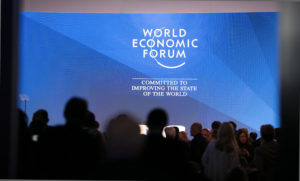Davos: Another “WEF” of Promise
 Photo by Eric Bridiers, U.S. Embassy Bern
Photo by Eric Bridiers, U.S. Embassy Bern Discussions in the World Economic Forum (WEF) are historically mundane, with world leaders debating how to spur key trade deals and the like. However, things have been heating up as the climate crisis has become a key discussion topic for those attending the meeting, held in Davos, Switzerland, and commonly referred to simply as “Davos.”
This year’s forum brought together a diverse collection of individuals from various sectors—business, government, nonprofit—as well as young people, scientists, and others to discuss how the assembled billionaires can remedy the global climate crisis.
Davos may not have focused so much energy or time on climate action if not for climate activists working to bring this urgency to decision makers’ attention. Individuals like Vanessa Nakate, Greta Thunberg, Isabelle Axelsson, and Quannah Chasing Horse, many of whom were invited to Davos, brought the climate crisis to the vanguard of this forum. As Davos attendees acknowledged the climate crisis, others pled for swifter action to address the grim reality their communities face.
Some panelists, like Hindou Oumarou Ibrahim from the Association of Peul Women and Autochthonous Peoples of Chad, expressed how global leaders need to consider solutions to implement now, not three decades down the road. “This is today,” Ibrahim said:
This is our reality. When the forest is barren in Australia, in the Amazon, its forest that is disappearing. Back in my region, it’s people that are dying. Dying because of the climate change. Losing their lives. They would not think about the future. When people talk about 2050, for me, I’m like, really? Seriously. By 2050, there’s no solution for this planet. We need it now.
Major organizations with significant clout argued that acting on the climate crisis is imperative, and given their pledges, these groups should be expected to tackle the problem with their existing corporate relationships and partnerships. For example, Rajiv Shah, president of the Rockefeller Foundation, said:
Climate change today bears its brunt mostly on the bottom two billion people on the planet. And so our commitment to Paris, our commitment to be serious and urgent and taking actions to meet those targets, is not just about protecting the future. It is also about protecting today people who rely on climate, environment and those natural resources to survive and to thrive.
And Ian Bremmer, founder and president of the political risk firm Eurasia Group, opined:
[Climate change] is going to require multinational corporations to act differently; it will lead to new corporations that will do better.
Some leaders are putting their money where their mouth is, as asset managers and investors are beginning to divest, looking to center climate change to their mission. BlackRock, the world’s largest asset manager, “will remove companies that generate more than 25 percent of their revenues from coal production from its actively managed portfolios.”
Such a shift from involvement in fossil fuels indicates that actors in the business world know that climate change will be a central factor in reshaping the world’s financial system and the net value of commodities in the future.
Other Davos discussions revolved around familiar climate change aversion tactics, including cap-and-trade systems, which effectively put a price on carbon emissions and limit the amount of overall pollutants a company can emit before encountering fines.
One immediate and tangible victory from the forum was the announcement of the One Trillion Trees initiative, which is a promising conservation effort to restore and plant a trillion trees around the world by the end of this decade.
Unfortunately, as far as sending a delegation of climate champions, the United States fell short. The president attended, but he never mentioned climate change when he had the floor. It was a palpable reminder that the United States is the only major developed country not currently party to the Paris Climate Agreement. US Treasury Secretary Steve Mnuchin attacked prominent climate activist Greta Thunberg , claiming that divestment from fossil fuels wasn’t feasible and telling her to take an economics class.
The recent WEF gave us, if not a solid commitment from the rich and powerful, a hopeful whiff that major global actors, whether they be policymakers or billionaire business people, recognize the imperative on the global community to act on climate. Whether the Davos players’ primary goal is economic gain or environmental preservation, some common ground can be found.
If decision makers continue this caliber of dialogue beyond hanging out in the Swiss Alps, the world might resist the global temperature rising two degrees above the pre-Industrial era levels, which most experts agree is the bar to remain under in order to avert the worst catastrophes of climate change.
Couldn’t make it to Davos but interested in making a difference of your own? Keep your eyes open for a climate strike or climate protest happening in your community and check for important updates on our Humanist Environmental Response Effort (HERE) for Climate site.
